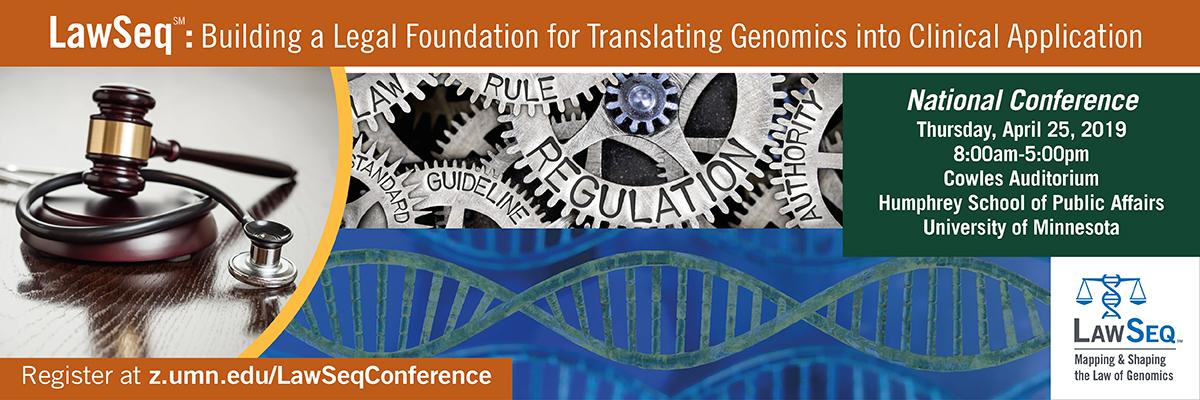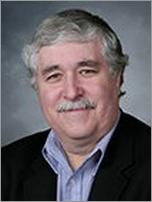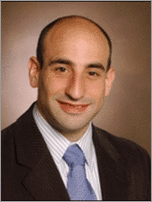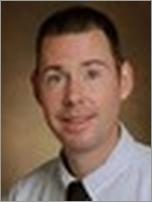
Genetics and genomics are becoming crucial to clinical care. As the "precision medicine" revolution spreads, cancer treatment, rare disease diagnosis, and cardiac care increasingly use genomics. Unfortunately, policy lags behind science, and the law governing genomics remains unclear and contested.
This conference presented LawSeq℠ — an NIH-funded project to shape the law of genomics and build a solid foundation for clinical integration. This event was an opportunity for top legal and scientific experts to share their analysis of US federal and state genomics law and policy, and debate the LawSeqSM project's recommendations, which are designed to shape the future of this powerful, emerging technology.
Agenda
All sessions are plenary
8:00am
Welcome
Introduction: Susan M. Wolf, JD, Co-PI, LawSeqSM; McKnight Presidential Professor of Law, Medicine & Public Policy; Chair, Consortium on Law and Values in Health, Environment & the Life Sciences, University of Minnesota
• Douglas Yee, MD, John H. Kersey Chair in Cancer Research, Professor of Medicine & Pharmacology, Director, Masonic Cancer Center, University of Minnesota
8:15am
Keynotes: Is Law Helping or Hurting Translation of Genomics into Clinical Practice? Two Views from the Trenches
Clinical Genomics: Legal Obstacles & Opportunities
• James P. Evans, MD, PhD, Bryson Distinguished Professor of Genetics and Medicine and Director of Adult Genetic Services, School of Medicine University of North Carolina, Chapel Hill; Former Editor, Genetics in Medicine
The Past, Present and Future of Genomics Law
• Mark Barnes, JD, LLM, Partner, Ropes & Gray, LLP
Q/A
9:15am
Project Analyses, Recommendations, and Collaboration on Approaches to Underserved Populations
• Susan M. Wolf, JD
• Ellen Wright Clayton, MD, JD, Co-PI, LawSeqSM; Craig-Weaver Professor of Pediatrics, Professor of Law, Professor of Health Policy, and Co-founder of the Center for Biomedical Ethics and Society, Vanderbilt University School of Medicine
Q/A
10:00am
Project Empirical Research – What Problems and Solutions do Stakeholders Report?
• Frances Lawrenz, PhD, Co-PI, LawSeqSM; Associate Vice President for Research, Wallace Professor of Teaching and Learning, Department of Educational Psychology, College of Education and Human Development, University of Minnesota
Q/A
10:30am
Break
10:45am
Panel #1 – From Genetics to Genomics: Facing the Liability Implications in Clinical Care
• Gary Marchant, JD, PhD, MPP, Professor of Law, Regents' Professor, Lincoln Professor of Emerging Technologies, Law & Ethics, Arizona State University
(Panel moderator: Gary Marchant)
- Bonnie LeRoy, MS, CGC, Professor and Director, Graduate Program of Study in Genetic Counseling, University of Minnesota; Editor, Journal of Genetic Counseling: Liability Exposure for Genetic Counselors in the Genomics Era: Problems & Solutions
- Susan M. Wolf, JD: Establishing the Legal Standard of Care in Clinical Genomics
- Discussant: James P. Evans, MD, PhD
Q/A
12:00pm
Networking Lunch – Humphrey Center Atrium
12:45pm
Panel #2 – Deconstructing Quality in the Age of Genomic Testing
• Ellen Wright Clayton, MD, JD
(Panel moderators: Barbara J. Evans, JD, PhD, LLM, Mary Ann & Lawrence E. Faust Professor of Law, Professor, Electrical and Computer Engineering, Director, Center on Biotechnology & Law, University of Houston; Thomas Morgan, MD, FACMG, Associate Professor of Pediatrics, Vanderbilt University School of Medicine)
- Kenneth Beckman, PhD, Director, University of Minnesota Genomics Center, Affiliate faculty, Institute for Health Informatics, University of Minnesota: Ensuring the Quality of Clinical Sequencing: Laboratory Perspectives on Separating Sequencing from Interpretation
- Pilar Ossorio, PhD, JD, Professor of Law and Bioethics, Co-director of the Law and Neuroscience Program, University of Wisconsin, Madison; Bioethics Scholar in Residence, Morgridge Institute for Research: How Should Law Regulate the Quality of Black-Box Algorithms and Software for Genomic Variant Interpretation?
- Ralph F. Hall, JD, Partner, Leavitt Partners; Professor of Practice, University of Minnesota Law School: How Should FDA Approach Laboratory-Developed Tests (LDTs) in Genomics?
- Wylie Burke, MD, PhD, Professor and former Chair of the Department of Bioethics and Humanities, Adjunct Professor of Medicine (in the Division of Medical Genetics), and Member of the Fred Hutchinson Cancer Research Center, University of Washington: Improving Recommendations for Genomic Medicine: An Evolutionary Approach
Q/A
2:00pm
Panel #3 – The Law of Genetic Privacy: Applications, Implications and Limitations
• Mark Rothstein, JD, Herbert F. Boehl Chair of Law and Medicine, Brandeis School of Law, Founding Director of the Institute for Bioethics, Health Policy and Law, School of Medicine, University of Louisville
(Panel moderator: Ellen Wright Clayton, MD, JD)
- Kevin B. Johnson, MD, MS, Cornelius Vanderbilt Professor & Chair, Department of Biomedical Informatics, Professor, Department of Pediatrics, Senior Vice President of Health Information Technology, Vanderbilt University Medical Center: The Challenges of Incorporating Genomics into the Electronic Health Record (EHR) and Supporting Proper Use
- Leslie E. Wolf, JD, MPH, Professor of Law, Distinguished University Professor, Center for Law Health and Society, Georgia State University: How Should Law Protect Genomic Research Data? From Certificates of Confidentiality to the Revised Common Rule
- Bradley Malin, PhD, Professor of Biomedical Informatics & Vice Chair for Research, Professor of Biostatistics, Professor of Computer Science, Affiliated Faculty of the Center for Biomedical Ethics & Society, Vanderbilt University Medical Center: How Effective Is De-identification in Securing Privacy? What Else Is Needed?
- Barbara J. Evans, JD, PhD, LLM: The Law on Access to Genomic Data and Interpreted Results
- William McGeveran, JD, Associate Dean for Academic Affairs, Professor of Law, Solly Robins Distinguished Research Fellow, University of Minnesota Law School: Incorporating Broader Trends of Privacy and Data Protection Law Into Regulation of Genomics
Q/A
3:15pm
Break
3:30pm
Panel #4 – Integrating Rules for Genomic Research, Clinical Care, Public Health Screening & DTC Testing: Creating Translational Law for Translational Genomics
• Susan M. Wolf, JD; Pilar Ossorio, JD, PhD
(Panel moderators: Susan M. Wolf, JD; Pilar Ossorio, JD, PhD)
- Michelle Penny, PhD, Senior Director, Head of Translational Genomic Sciences, Biogen: Industry Perspectives on the Relationship Between Pharmaceutical Company Research and Clinical Genomics
- Susan Berry, MD, Division Director for Genetics and Metabolism, Department of Pediatrics, University of Minnesota: The Interface Between Newborn Screening and Clinical Genomics
- James W. Hazel, PhD, JD, Postdoctoral Fellow at the Center for Genetic Privacy and Identity in Community Settings (GetPreCiSe), Vanderbilt University Medical Center: Privacy Best Practices for Direct-to-Consumer Genetic Testing Services: Are Industry Efforts at Self-Regulation Sufficient?
- Henry T. Greely, JD, Director, Center for Law and the Biosciences, Professor (by courtesy) of Genetics, Chair, Steering Committee of the Center for Biomedical Ethics, Director, Program in Neuroscience and Society, Stanford University: The Future of DTC Genomics: Facing the Legal Challenge
Q/A
4:45pm
Wrap-up: The Future of the Law of Genomics
LawSeqSM PIs: Susan M. Wolf, JD; Ellen Wright Clayton, MD, JD; Frances Lawrenz, PhD
5:00pm
Adjourn
Speaker Biographies

Mark Barnes, JD, LLM, is a Partner at Ropes & Gray, LLP. He has extensive experience in legal issues related to research with humans and animals, stem cell and genetic research, research grants and contracts, research misconduct, international research and data privacy. In 2012, with Dr. Barbara Bierer, Mark started, and continues to serve as faculty co-chair of, the Multi-Regional Clinical Trials Center of Harvard University and Brigham and Women’s Hospital, a project designed to improve the planning, conduct and regulation of multi-national clinical trials, with a special emphasis on trials in the emerging economies.

Kenneth Beckman, PhD, is Director of the Genomics Center, University of Minnesota and affiliate faculty with the University's Institute for Health Informatics. He is also a Co-Founder and serves as Chief Operations Officer of CoreBiome, Inc., where he directs lab operations. Prof. Beckman has over 16 years of biotech experience, having led genomics R&D at Operon Technologies and co-founded Gorilla Genomics, Inc. He was educated at Cornell, Cambridge, and Berkeley.

Susan Berry, MD, is Division Director for Genetics and Metabolism in the Department of Pediatrics at the University of Minnesota. She attended Rice University where she received her degree in Biochemistry and the University of Kansas for her Doctor of Medicine degree. She has been at the University of Minnesota since 1978 where she completed her residency in Pediatrics and was a fellow in Medical Genetics. She joined the staff of the Department in 1984 and is currently a Professor in the Departments of Pediatrics, Ophthalmology and Genetics, Cell Biology and Development. She is a member of the Minnesota Department of Health Newborn Screening Advisory Committee, of the Society for Inherited Metabolic Disease, of the American Society of Human Genetics and is a Fellow of the American Academy of Pediatrics and of the American College of Medical Genetics.

Wylie Burke, MD, PhD, is Professor and former Chair of the Department of Bioethics and Humanities at the University of Washington, Adjunct Professor of Medicine (in the Division of Medical Genetics), and Member of the Fred Hutchinson Cancer Research Center. Her work focuses on the ethical and policy implications of genetic information in research, public health and clinical care. She founded the University of Washington Center for Genomics and Healthcare Equality, an NHGRI-funded center addressing the implications of genomic research for underserved communities; and co-directs the Northwest-Alaska Pharmacogenomics Research Network, a research partnership involving universities and tribal communities in Alaska, Montana and Washington. Dr. Burke received a PhD in Genetics and an MD from the University of Washington, and completed Internal Medicine residency training at the University of Washington, where she was also a Medical Genetics fellow. She is a member of the Institute of Medicine and past President of the American Society of Human Genetics.

Ellen Wright Clayton, MD, JD, is Craig-Weaver Professor of Pediatrics, Professor of Law, and Co-founder of the Center for Biomedical Ethics and Society, Vanderbilt University. She is the 2010 recipient of the William G. Bartholome Award for Ethical Excellence from the American Academy of Pediatrics’ Section on Bioethics. Prof. Clayton is an elected member of the Institute of Medicine (IOM), where she serves on the National Advisory Council, and a Fellow of the American Association for the Advancement of Science (AAAS). She has advised the National Institutes of Health and other federal and international bodies on topics ranging from children's and women's health to the ethical conduct of human subject research. She is currently a Principal Investigator on a project funded by the National Human Genome Research Institute (NHGRI) and National Cancer Institute (NCI) of the National Institutes of Health, LawSeq: Building a Sound Legal Foundation for Translating Genomics into Clinical Application (1-R01-HG008605).

Barbara Evans, JD, PhD, LLM, is the Mary Ann & Lawrence E. Faust Professor of Law and Director of the Center for Biotechnology & Law at the University of Houston Law Center, a member institution of the Texas Medical Center. She holds a joint appointment as Professor of Electrical and Computer Engineering at the UH Cullen College of Engineering. Her current research interests include FDA regulation of machine-learning clinical and patient decision support software and gene sequencing and editing technologies; health data privacy and access; genomic civil rights; and citizen science and citizen-led bioethics standard-setting.

James P. Evans, MD, PhD, is the Bryson Distinguished Professor of Genetics & Medicine and Director of Adult and Cancer Genetics Services at the School of Medicine, University of North Carolina (UNC). He is also Editor-in-Chief for Genetics in Medicine, the journal of the American College of Medical Genetics. After obtaining his MD and PhD from the University of Kansas, he served as resident and Chief Resident of Internal Medicine at UNC. He trained in medical genetics at the University of Washington. Prof. Evans is interested in cancer genetics, the use of new sequencing technologies in clinical care, and broad issues related to the use of genetic information. He has serves as an advisor and educator to both the executive and judicial branches of the Federal government regarding genetic matters.

Henry T. Greely, JD, is the Deane F. and Kate Edelman Johnson Professor of Law; Director of the Center for Law and the Biosciences; Professor (by courtesy) of Genetics, Stanford School of Medicine; Chair of the Steering Committee of the Center for Biomedical Ethics; and Director of the Stanford Program in Neuroscience and Society. Prof. Greely specializes in the ethical, legal, and social implications of new biomedical technologies, particularly those related to neuroscience, genetics, or stem cell research. He frequently serves as an advisor on California, national, and international policy issues. He is chair of California’s Human Stem Cell Research Advisory Committee, a member of the Advisory Council of the NIH’s National Institute for General Medical Sciences, a member of the Committee on Science, Technology, and Law of the National Academies, a member of the Neuroscience Forum of the Institute of Medicine, and served from 2007-2010 as co-director of the Law and Neuroscience Project, funded by the MacArthur Foundation.

Ralph F. Hall, JD, is a Professor of Practice at the Law School. He concentrates his teaching, research and writing in the area of FDA regulation and health care. He is also a principal with Leavitt Partners, a health care policy and consulting firm. At Leavitt Partners he works with coalitions and clients focused on improving FDA and health care regulation and advancing value based health care. He also serves as CEO of MR3 Medical LLC, a start-up medical device company. He is a frequent speaker on FDA regulatory issues and compliance matters and has testified a number of times before Congressional committees.

James W. Hazel, PhD, JD, is a postdoctoral fellow at the Center for Genetic Privacy and Identity in Community Settings (GetPreCiSe) at Vanderbilt University Medical Center. His current research centers on developing a better understanding of the ethical, legal, and social implications of emerging technologies, with a focus on the direct-to-consumer genetic testing industry and the privacy policies governing the collection, use, and, sharing of genetic data. Dr. Hazel’s research has appeared in academic journals including Science, Genetics, and the Cornell Journal of Law and Public Policy, and has been cited by popular media outlets such as the Wall Street Journal, Washington Post, Bloomberg News, and Business Insider. He holds a law degree (JD) from Vanderbilt University Law School and a PhD in Molecular Biology from the University of Wyoming.

Kevin Johnson, MD, MS, is the Cornelius Vanderbilt Professor & Chair of the Department of Biomedical Informatics; Professor in the Department of Pediatrics; and Senior Vice President of Health Information Technology at Vanderbilt University Medical Center. Prof. Johnson is an internationally-respected developer and evaluator of clinical information technology. His research interests have been related to developing and encouraging the adoption of clinical information systems to improve patient safety and compliance with practice guidelines; the uses of advanced computer technologies, including the Worldwide Web, personal digital assistants, and pen-based computers in medicine; and the development of computer-based documentation systems for the point of care. He is the author of over 100 publications and books or book chapters. He is a former recipient of the Robert Wood Johnson Foundation’s Harold Amos Medical Faculty Development Award, and is also a recipient of the American Academy of Pediatrics Byron B. Oberst Award in recognition of his informatics education efforts.

Frances Lawrenz, PhD, is Associate Vice President for Research and Wallace Professor of Teaching and Learning at the University of Minnesota. Her research focuses on science and mathematics program evaluation, utilizing a variety of techniques and usually involving mixed methodologies. Along with her teaching duties, Prof. Lawrenz is currently involved in the evaluation of several national science and mathematics programs. She has been recognized by the American Educational Research Association, having been awarded the 2016 Research on Evaluation SIG Distinguished Scholar Award for outstanding contributions to advance research in the field of evaluation, and by the National Association for Research in Science Teaching, with the Distinguished Contributions to Science Education through Research Award for outstanding contributions to science education in 2014. She is currently a Principal Investigator on a project funded by the National Human Genome Research Institute (NHGRI) and National Cancer Institute (NCI) of the National Institutes of Health, LawSeqSM: Building a Sound Legal Foundation for Translating Genomics into Clinical Application (1-R01-HG008605).

Bonnie LeRoy, MS, CGC, is a Professor and Director of the Graduate Program of Study in Genetic Counseling at the University of Minnesota. She is also Editor of the Journal of Genetic Counseling, and Co-Author (with Ian MacFarlane and Patricia McCarthy Veach) of Genetic Counseling Research: A Practical Guide (Oxford University Press, 2014). Prof. LeRoy's major areas of interest focus on the education and clinical preparation of genetic counseling professionals. The Graduate Program of Study in Genetic Counseling, which she directs, offers a Master of Science degree in molecular, cellular, developmental biology and genetics with an emphasis of study in genetic counseling. LeRoy is also interested in the psychosocial issues and ethical challenges involved with the provision of genetic counseling services. She has been involved in a series of projects investigating the return of genomic results to patients and families in both clinical and research settings.

Bradley Malin, PhD, is the Professor of Biomedical Informatics & Vice Chair for Research; Professor of Biostatistics; Professor of Computer Science; and Affiliated Faculty of the Center for Biomedical Ethics & Society at Vanderbilt University Medical Center. He co-directs the Health Data Science (HEADS) Center, the Center for Genetic Privacy and Identity in Community Settings (GetPreCiSe),and the Big Biomedical Data Science PhD program. He is also the director of the Health Information Privacy Laboratory (HIPLab), which was established to address the growing need for data privacy research and development for the health information technology sector. In addition to its role as a scientific research program, since 2007, he has led a data privacy consultation service for the Electronic Medical Records and Genomics (eMERGE) network, an NIH consortium. He is also the co-chair of the Data Privacy and Security Working Group of the All of Us Research Program of the U.S. Precision Medicine Initiative.

Gary Marchant, JD, PhD, MPP, is a Regents Professor; Professor of Law and Faculty Director for the Center for Law, Science & Innovation in the Sandra Day O'Connor College of Law; Lincoln Professor of Emerging Technologies, Law & Ethics; Professor in the School of Life Sciences; and Distinguished Sustainability Scientist in the Global Institute of Sustainability at Arizona State University. His research interests include legal aspects of genomics and personalized medicine, the use of genetic information in environmental regulation, risk and the precautionary principle, and governance of emerging technologies such as nanotechnology, neuroscience, biotechnology and artificial intelligence. Professor Marchant frequently lectures about the intersection of law and science at national and international conferences. He has authored more than 150 articles and book chapters on various issues relating to emerging technologies. Among other activities, he has served on five National Academy of Sciences committees, has been the principal investigator on several major grants, and has organized numerous academic conferences on law and science issues.

William McGeveran, JD, is Associate Dean for Academic Affairs; Professor of Law; and Solly Robins Distinguished Research Fellow at the University of Minnesota Law School. Prof. McGeveran's current research focuses on legal and other rules governing digital identity and data privacy, ranging from online impersonation to the privacy features of Facebook and other social networks. Additional aspects of his research include modernizing trademark law, comparing European and American approaches to data protection, and navigating the tension between transparency and privacy in areas such as election regulation or open records laws. He is an affiliated professor at the School of Journalism and Mass Communications and has been a resident fellow at the University of Minnesota Institute for Advanced Study. Prof. McGeveran has also been a visiting professor at University College Dublin School of Law. He frequently uses Twitter (as @BillMcGev), comments in the media, and teaches continuing education courses. He also serves on the advisory board of the Future of Privacy Forum.

Thomas M. Morgan, MD, FACMG, is Associate Professor of Pediatrics with a specialty in medical genetics at the Vanderbilt University School of Medicine. Prof. Morgan has been cross-trained in clinical epidemiology, family medicine, clinical genetics, and medical biochemical genetics. As a Robert Wood Johnson Clinical Scholar at Yale, Dr. Morgan received advanced training in clinical epidemiology and health care systems and policy. He has authored over 50 publications pertaining to complex genetics research. He also served as a voting member of the Institutional Review Board at Vanderbilt University. In 2013, he was selected as Vanderbilt’s representative at the Advancing Ethical Research Conference of the Public Responsibility in Medicine & Research (PRIM&R), and he delivered the 2014 Gheen’s Foundation Visiting Scholar in Humanism in Medicine Lecture at the University of Louisville on the history of ethics in genetic research. Morgan was formerly the Head of Human Disease Genetics at the Novartis Institutes for BioMedical Research within the Division of Biomarker Development, in which capacity he served as a member of the Novartis Ethics Advisory Group and has exposure to clinical trial and investigator-initiated trial ethics.

Pilar Ossorio PhD, JD, is Professor of Law and Bioethics at the University of Wisconsin, Madison, where she is on the faculty of the Law School and the Department of Medical History and Bioethics at the Medical School. In 2011 she became the inaugural Ethics Scholar-in-Residence at the Morgridge Institute for Research, the private, nonprofit research institute that is part of the Wisconsin Institutes for Discovery. Prof. Ossorio also serves as the co-director of UW's Law and Neuroscience Program, as a faculty member in the UW Masters in Biotechnology Studies program, and as Program Faculty in the Graduate Program in Population Health. Prior to taking her position at UW, she was Director of the Genetics Section of the Institute for Ethics at the American Medical Association and taught as adjunct faculty at the University of Chicago Law School.

Michelle Penny, PhD, is Senior Director and Head of Translational Genome Sciences at Biogen. Dr. Penny has over 15 years’ experience in applying genetics across many different disease areas in research and development in the pharmaceutical industry. She is Co-Chair of the National Academy of Sciences Roundtable on Genomics and Precision Health and the Industry Pharmacogenomics Working Group. She received her PhD in Genetics from the University of Birmingham, UK, in 1993. After a postdoctoral fellowship in the Virology Division at the National Institute of Medical Research, Mill Hill, London, she joined the Department of Medical and Community Genetics at Imperial College London, where she was a Postdoctoral Research Scientist until taking a lectureship in Human Molecular Genetics in 1998. Her academic research career focused on the study of complex polygenic diseases, particularly autoimmune disease, and susceptibility to infection. In 2002, Dr. Penny joined the Clinical Pharmacogenomics group at Pfizer in Sandwich, UK; she moved to New London, Connecticut, in 2006 to take on the role of OncologyMolecular Medicine Lead until 2009, when she moved to Indianapolis to lead pharmacogenomics work at Eli Lilly and Company. Michelle joined the Computational Biology and Genomics group at Biogen in 2015.

Mark A. Rothstein, JD, is Herbert F. Boehl Chair of Law & Medicine at the Brandeis School of Law and Founding Director of the Institute for Bioethics, Health Policy & Law in the School of Medicine at the University of Louisville. Prof. Rothstein has concentrated his research on bioethics, genetics, health privacy, public health law, and employment law. From 1999-2008, he served as Chair of the Subcommittee on Privacy and Confidentiality of the National Committee on Vital and Health Statistics, the statutory advisory committee to the Secretary of Health and Human Services on health information policy. He is past-President of the American Society of Law, Medicine & Ethics (ASLME). Prof. Rothstein serves as Public Health Ethics editor for the American Journal of Public Health, and writes a regular column on bioethics for the Journal of Law, Medicine & Ethics.

Leslie E. Wolf, JD, MPH, is a Professor of Law, with appointments in the College of Law and the School of Public Health, ad the Director for the Center for Law, Health & Society at Georgia State University. She conducts research in a variety of areas in health and public health law and ethics, with a particular focus on research ethics. Her research has been funded by the National Institute of Mental Health, the National Cancer Institute, the National Human Genome Research Institute, the Agency for Healthcare Research and Quality, and the Greenwall Foundation. This work includes empirical research on conflicts of interest, research with stored biological materials, Certificates of Confidentiality, IRB web guidance, and HIV-related laws and policies. Wolf is a member of the Secretary’s Advisory Committee on Human Research Protections (SACHRP), which provides expert advice and recommendations to the Department of Health and Human Services’ Secretary on issues pertaining to the protection of human subjects in research. She also serves as an educational liaison to the Georgia State Human Research Protection Program.

Susan M. Wolf, JD, is McKnight Presidential Professor of Law, Medicine & Public Policy; Faegre Baker Daniels Professor of Law; and Professor of Medicine at the University of Minnesota. Prof. Wolf is Chair of the Consortium on Law and Values in Health, Environment & the Life Sciences. She is an elected member of the National Academy of Medicine (NAM) and a Fellow of the American Association for the Advancement of Science. Prof. Wolf's research has been supported by the National Institutes of Health (NIH) and National Science Foundation (NSF) as well as private foundations including the Robert Wood Johnson Foundation and The Greenwall Foundation. She is currently a Principal Investigator on a project funded by the National Human Genome Research Institute (NHGRI) and National Cancer Institute (NCI) of the National Institutes of Health, LawSeq: Building a Sound Legal Foundation for Translating Genomics into Clinical Application (1-R01-HG008605).

Douglas Yee, MD, is Director of the Masonic Cancer Center, designated a comprehensive cancer center by the National Cancer Institute. He has a joint appointment as Professor of Medicine and Pharmacology; is a Professor in the Department of Pharmacology Microbiology, Immunology and Cancer Biology (MICaB) PhD Graduate Program; and holds the John H. Kersey Chair in Cancer Research at the University of Minnesota. As Director of the Cancer Center, Prof. Yee serves as the point person for all cancer research at the University. He also treats patients with breast cancer and conducts research to improve cancer therapies. Currently, he is striving to understand the role of insulin-like growth factor (IGF) in stimulating cancer cells to multiply and spread. His research is aimed at finding methods to target growth factor receptors with targeted therapies.
Planning Committee

Susan M. Wolf, JD, is McKnight Presidential Professor of Law, Medicine & Public Policy; Faegre Baker Daniels Professor of Law; and Professor of Medicine at the University of Minnesota. Prof. Wolf is Chair of the Consortium on Law and Values in Health, Environment & the Life Sciences. She is an elected member of the National Academy of Medicine (NAM) and a Fellow of the American Association for the Advancement of Science. Prof. Wolf's research has been supported by the National Institutes of Health (NIH) and National Science Foundation (NSF) as well as private foundations including the Robert Wood Johnson Foundation and The Greenwall Foundation. She is currently a Principal Investigator on a project funded by the National Human Genome Research Institute (NHGRI) and National Cancer Institute (NCI) of the National Institutes of Health, LawSeqSM: Building a Sound Legal Foundation for Translating Genomics into Clinical Application (1-R01-HG008605).

Ellen Wright Clayton, MD, JD, is Craig-Weaver Professor of Pediatrics, Professor of Law, and Co-founder of the Center for Biomedical Ethics and Society, Vanderbilt University. She is the 2010 recipient of the William G. Bartholome Award for Ethical Excellence from the American Academy of Pediatrics’ Section on Bioethics. Prof. Clayton is an elected member of the Institute of Medicine (IOM), where she serves on the National Advisory Council, and a Fellow of the American Association for the Advancement of Science (AAAS). She has advised the National Institutes of Health and other federal and international bodies on topics ranging from children's and women's health to the ethical conduct of human subject research. She is currently a Principal Investigator on a project funded by the National Human Genome Research Institute (NHGRI) and National Cancer Institute (NCI) of the National Institutes of Health, LawSeqSM: Building a Sound Legal Foundation for Translating Genomics into Clinical Application (1-R01-HG008605).

Frances Lawrenz, PhD, is Associate Vice President for Research and Wallace Professor of Teaching and Learning at the University of Minnesota. Her research focuses on science and mathematics program evaluation, utilizing a variety of techniques and usually involving mixed methodologies. Along with her teaching duties, Prof. Lawrenz is currently involved in the evaluation of several national science and mathematics programs. She has been recognized by the American Educational Research Association, having been awarded the 2016 Research on Evaluation SIG Distinguished Scholar Award for outstanding contributions to advance research in the field of evaluation, and by the National Association for Research in Science Teaching, with the Distinguished Contributions to Science Education through Research Award for outstanding contributions to science education in 2014. She is currently a Principal Investigator on a project funded by the National Human Genome Research Institute (NHGRI) and National Cancer Institute (NCI) of the National Institutes of Health, LawSeqSM: Building a Sound Legal Foundation for Translating Genomics into Clinical Application (1-R01-HG008605).
Resources
Background articles that may be useful for this conference include:
- Berg JS, Agrawal PB, Bailey DB, et al. Newborn Sequencing in Genomic Medicine and Public Health. Pediatrics 2017;139(2):e20162252.
- Bombard Y, Brothers KB, Fitzgerald-Butt S, et al. The Responsibility to Recontact Research Participants after Reinterpretation of Genetic and Genomic Research Results. American Journal of Human Genetics 2019;104(4)578-595.
- Burke W, Beskow LM, Trinidad SB, Fullerton SM, Brelsford K. Informed Consent in Translational Genomics: Insufficient Without Trustworthy Governance. Journal of Law, Medicine & Ethics 2018;46(1):79-86.
- Clayton EW, Halverson CM, Sathe NA, Malin BA. A Systematic Literature Review of Individuals’ Perspectives on Privacy and Genetic Information in the United States. PLoS ONE 2018;13(10):e0204417.
- David KL, Best RG, Brenman LM, et al. Patient Re-contact After Revision of Genomic Test Results: Points to Consider — A Statement of the American College of Medical Genetics and Genomics (ACMG). Genetics in Medicine 2019;21(4)768-771.
- Evans BJ, Ossorio P. The Challenge of Regulating Clinical Decision Support Software after 21st Century Cures. American Journal of Law & Medicine 2018;44:237-251.
- Evans BJ. HIPAA’s Individual Right of Access to Genomic Data: Reconciling Safety and Civil Rights. American Journal of Human Genetics 2018;102:05-10.
- Hazel JW, Slobogin C. Who Knows What, and When?: A Survey of the Privacy Policies Proffered by US Direct-to-Consumer Genetic Testing Companies. Cornell Journal of Law and Public Policy (2018);28(35):35-66.
- Holm IA, Agrawal PB, Ceyhan-Birsoy O. The BabySeq Project: Implementing Genomic Sequencing in Newborns. BMC Pediatrics 2018;18(1):225.
- Marchant GE, Lindor RA. Personalized Medicine and Genetic Malpractice. Genetics in Medicine (2013);15(12):921-922.
- Morgan TM. Genomic Screening: The Mutation and the Mustard Seed. Journal of Law, Medicine & Ethics 2018;46(2):541-546.
- Rothstein MA. GINA at Ten and the Future of Nondiscrimination Law. Hastings Center Report 2018;48(3):5-7.
- Stevens YA, Senner GD, Marchant GE. Physicians’ Duty to Recontact and Update Genetic Advice. Personalized Medicine (2017);14(4):367-374.
LawSeqSM Genomics Law Database
This event is part of the NIH-funded LawSeq℠ project, which is dedicated to building a sound legal foundation for translating genomics into clinical application. Supported by the National Human Genome Research Institute (NHGRI) and National Cancer Institute (NCI), National Institutes of Health grant #1-R01-HG008605.
Continuing Education Information
To earn Continuing Education credits, webcast viewers must email us at [email protected] during the webcast to confirm their wish to receive CE credits. Later viewing of this video will not qualify for credit.
Attorneys: The Minnesota State Board of Continuing Legal Education approved 7.25 Continuing Legal Education (CLE) credits; Event Code is 269342.
Continuing Medical Education
Accreditation Statement
In support of improving patient care, University of Minnesota, Interprofessional Continuing Education is jointly accredited by the Accreditation Council for Continuing Medical Education (ACCME), the Accreditation Council for Pharmacy Education (ACPE), and the American Nurses Credentialing Center (ANCC) to provide continuing education for the healthcare team.
Credit Designation Statements
American Medical Association (AMA)
The University of Minnesota, Interprofessional Continuing Education designates this live activity for a maximum of 7.5 AMA PRA Category 1 Credits™. Physicians should claim only the credit commensurate with the extent of their participation in the activity.
Other Healthcare Professionals
Other healthcare professionals who participate in this CE activity may submit their statement of participation to their appropriate accrediting organizations or state boards for consideration of credit. The participant is responsible for determining whether this activity meets the requirements for acceptable continuing education.
Educational Objectives for this conference:
- Recognize the current state of genomic medicine laws and regulations and be better prepared to pursue research activities and/or treat patients in an ethical, legally sound manner.
- Describe the particular issues and sensitivities related to genomic research and clinical care with under-served communities.
- Recall the existing law and policy related to liability, data privacy, and genomic interpretation, as well as the interface between research and clinical care.
This activity was designed for primary care physicians, pharmacists, psychologists, PAs, RNs, NPs and other healthcare professionals as well as attorneys, policymakers, patient advocates and community members.